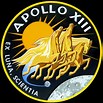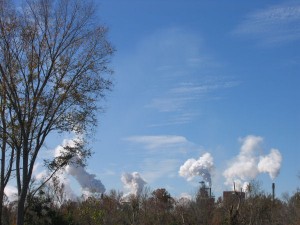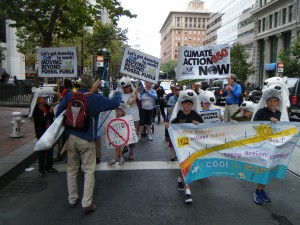The following article was published January 13 on the Daily Kos: http://www.dailykos.com/story/2015/01/13/1357528/-Houston-We-Have-a-Problem. The author, Bill Carney, is president of Sustainable San Rafael.
 I didn’t own a TV in 1970, so my knowledge of the Apollo 13 tragedy-turned-triumph is pretty much limited to the Tom Hanks movie twenty-five years after the fact. But as I watch our new Republican Congress assume the controls of climate policy, I find myself repeating, in quiet desperation, “Houston, we have a problem.”
I didn’t own a TV in 1970, so my knowledge of the Apollo 13 tragedy-turned-triumph is pretty much limited to the Tom Hanks movie twenty-five years after the fact. But as I watch our new Republican Congress assume the controls of climate policy, I find myself repeating, in quiet desperation, “Houston, we have a problem.”
It wasn’t just that I didn’t own a TV back then. It was also that I trusted the spirit, ingenuity and tenacity of the American enterprise to pull through and save the day. That youthful confidence in America turned out to be well founded.
But with climate change, I’m not so sure.
Which is why I’m directing this communication primarily to my friends, relatives and countrymen in Texas—arguably Mission Control for both the oil industry driving climate change and the political climate beclouding effective action to fix this potentially catastrophic malfunction in the human stewardship of spaceship earth.
 As inside Apollo 13, our main problem now is the build-up of carbon dioxide to life-threatening levels. Just as the metabolism of the three men on board overwhelmed the life-support systems of their craft, the metabolism of our industrial technology—fueled by two centuries of burning coal, oil and gas—is overwhelming the natural systems of our planet.
As inside Apollo 13, our main problem now is the build-up of carbon dioxide to life-threatening levels. Just as the metabolism of the three men on board overwhelmed the life-support systems of their craft, the metabolism of our industrial technology—fueled by two centuries of burning coal, oil and gas—is overwhelming the natural systems of our planet.
That carbon overload is trapping sunlight and heating up the atmosphere like a locked car in a hot Texas parking lot. The heat kills directly, 70,000 people during a single European heat wave. Rising temperatures also trigger a cascade of broader failures in planetary functions that are critical to human wellbeing—storms spiraling to immense dimensions; ice caps and glaciers melting; storm surges and inundation teed up by rising sea levels; floods from intensifying rainfall; increasing droughts and wildfires.
Then come the related disruptions to human systems, agricultural, economic, humanitarian, security. And to our fellow species, precipitating the sixth mass extermination in geologic history.
“Houston, we have a problem.”
The Apollo astronauts were able to solve their atmospheric crisis, with a great deal of help and ingenuity from below, by salvaging a square carbon filter and jury-rigging it to fit onto a round hole. They literally tore apart their instruction manual to get the materials needed to make it work.
That’s the kind of creativity we need to bring to the climate crisis, along with the national teamwork to brainstorm solutions and the discipline to get the job done.
 Nature already has on board the necessary carbon filters. We can restore and replenish vast carbon-absorbing forests, coastal marshes and agricultural soils. We can also conserve what the Apollo team called “critical consumables”—mainly energy and water—with far greater efficiency and even elegance in the way we live.
Nature already has on board the necessary carbon filters. We can restore and replenish vast carbon-absorbing forests, coastal marshes and agricultural soils. We can also conserve what the Apollo team called “critical consumables”—mainly energy and water—with far greater efficiency and even elegance in the way we live.
But such remedial actions will only work if we simultaneously reduce the root cause of climate change, which is burning fossil fuels. Here we have a huge capability that the Apollo astronauts did not. We are able to change the industrial metabolism that’s emitting all that planet-baking carbon dioxide in the first place.
Again, we can do so with existing technologies and resources. We can convert our power grid from fossil fuels to clean renewable energy like wind, solar and hydro. We can construct zero-net-energy buildings, and ramp up an emission-free transportation network of electric cars and transit.
The challenge is how to harness the power of the marketplace to redirect the economy towards such choices. One ready method would be to gradually gear up a ‘fee-and-dividend’ program—charging the fossil fuel industry for the carbon pollution it emits, while returning the cash to consumers to purchase cleaner alternatives and offset any costs.
This is the kind of approach that conservatives should champion, since it would encourage economic innovation, diversification, and predictability. There are jobs to be created and money to be made.
The final challenge to the Apollo 13 mission was to manually adjust the trajectory needed to re-enter the earth’s atmosphere without burning up or bouncing off. The movie shows the team’s white-knuckled mastery of this near miracle by keeping the craft’s small porthole firmly aligned with the one fixed point available, the earth itself.
That’s exactly the point of reference that we need now to avoid the imminent disaster of a collapsing climate. The way home is to keep the earth clearly in view in all our decisions. Moreover, as the planet quickly warms towards irreversible tipping points, it increasingly looks like we may only get one shot to nudge our trajectory back on course. And it needs to be soon.
The first step is to get our new Congress—the actual Mission Control of climate stabilization—to hear clearly, we have a problem, and then provide the leadership to mobilize the ingenuity and spirit of our nation to return us to a healthy planet.
 Bill Carney has organized multiple public events, including lectures and rallies such as Marin County’s contingent for Moving Planet Day in San Francisco on Sep 24, 2011. As President of Sustainable San Rafael, he has kept Climate Protection and Climate Protection at the top of the agenda for city and county government.
Bill Carney has organized multiple public events, including lectures and rallies such as Marin County’s contingent for Moving Planet Day in San Francisco on Sep 24, 2011. As President of Sustainable San Rafael, he has kept Climate Protection and Climate Protection at the top of the agenda for city and county government.

